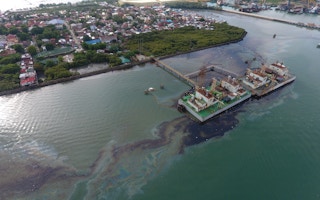Even as efforts to clean up a major oil spill off Iloilo City in the Philippines continue, the government has said it would fine AC Energy, the company responsible for the oil spill, and activists have called for affected communities to be compensated.
To continue reading, subscribe to Eco‑Business.
There's something for everyone. We offer a range of subscription plans.
- Access our stories and receive our Insights Weekly newsletter with the free EB Member plan.
- Unlock unlimited access to our content and archive with EB Circle.
- Publish your content with EB Premium.
A power barge operated by the energy arm of Filipino conglomerate Ayala Corporation spilled nearly 270,000 litres of bunker fuel off the coast of Iloilo City on the afternoon of 3 July, AC Energy told the Philippine Stock Exchange on Monday.
Power barges are self-contained, floating power plants that private companies deploy to address recurring electricity shortages in the Visayas grid.
Initial findings revealed that the oil spill was caused by a rupture in the barge’s fuel tank. The company said it was able to contain the leak at 10 pm, about seven hours after the incident occurred, after 170 combined personnel of the company and the coast guard were deployed.
The slick has polluted 1,200 square meters of Barrio Obrero and surrounding villages in the Lapuz district, according to a site report obtained by Eco-Business on Tuesday from the city’s disaster risk reduction and management office. Clean-up efforts could last for 15 days.
“
This latest incident shows how oil and other fossil fuel sources are dirty and dangerous to the environment and communities hosting these power plants. Communities shouldn’t have to suffer for fossil-fuel based energy and its local impacts.
Khevin Yu, climate and energy campaigner, Greenpeace
Smoke from the bunker fuel has forced some 255 families including 931 individuals to temporarily evacuate to a nearby elementary school as they complained of difficulty of breathing, sore throat and nasal congestion.
Activists have blasted the incident, which has affected the livelihoods of thousands of fishermen.
“Most of the residents come from fisherfolk communities that are already struggling to adjust to the logistical and economic impacts of the Covid-19 pandemic that have caused big losses in their sources of income and food security,” said Khevin Yu, climate and energy campaigner for the non-governmental organisation Greenpeace, in a statement.

Evacuated families try to stay one meter apart as they line up for relief goods at the Barrio Obrero Elementary School in Iloilo City. AC Energy said it was providing families with food, health care, protective equipment from the coronavirus, and is working on further relocation to other nearby schools to be able to observe social distancing. Image: Joy Borja Chavez / Iloilo City Social Welfare and Development Office
Just off Iloilo’s southeast coast is the island province of Guimaras, where 8,000 square metres of mangrove were also contaminated by the spill.
Iloilo and Guimaras rely on the salt-tolerant trees and shrubs to protect them from typhoons that frequently hit the vicinity.
Bunker fuel can damage mangroves by coating the trees and blocking respiration, according to scientists.
The oil spill is among the biggest marine disasters since an oil tanker sank off the coast of Guimaras in 2006, spilling more than 2.1 million litres of bunker fuel.
Touted as the worst oil spill in the country’s history, the incident in 2006 destroyed 1,000 hectares of mangrove forests, including parts of the Taclong Island Sanctuary, a feeding and breeding ground for fish and other species.
Fishing was halted on the island, putting an end to the only livelihood that 20,000 fisherfolks had known for decades. Tourism, another economic driver of the island, was also temporarily banned while the clean-up was ongoing.
“This latest incident shows how oil and other fossil fuel sources are dirty and dangerous to the environment and communities hosting these power plants. Communities shouldn’t have to suffer for fossil-fuel based energy and its local impacts. The burning of fossil fuels is also the main contributor to the climate crisis,” said Yu.
“Beyond a clean-up, we are asking power companies to rethink their businesses to immediately shift to renewable energy sources and phase out their oil and coal facilities.”
The oil spill comes almost three months after the Ayala-led energy firm announced its plan to wean off coal by 2030.
AC Energy to compensate coastal communities?
Green groups have called for AC Energy to pay for the damages from the spill, but the company’s corporate communications and sustainability head Irene Maranan said: “We are still assessing the damages and waiting for the results of the investigation.”
If found to be responsible for the oil spill, AC Energy should “compensate for the damages to communities, livelihoods affected, and destruction inflicted to the environment”, said Yu.
Activist fisherfolk group Pamalakaya called for AC Energy to shoulder the clean-up costs and step up containment efforts before the spill reaches more fishing grounds in the Visayas.
Fernando Hicap, Pamalakaya’s national chairman said: “We don’t want the repeat of the (2006) Guimaras oil spill that did not only literally paint the waters black, but devastated the marine environment and economic lives of thousands of fisherfolk.”










